Up to 300 Gaza children will come to the UK for urgent NHS treatment in mandatory medical evacuations
The UK is preparing to evacuate up to 300 critically ill and injured children from Gaza to receive urgent care on the NHS in one of the largest humanitarian medical efforts Britain has ever undertaken.
According to upcoming government plans, to be announced within weeks, each child will travel accompanied by a parent or guardian, with siblings allowed if necessary. The Home Office will carry out biometric and security checks before travel, ensuring proper vetting.
This initiative will operate alongside Project Pure Hope, a private charity already transporting Gazan children to the UK for private medical treatment.
The scale of the crisis is staggering. UNICEF estimates that more than 50,000 children have been killed or injured in Gaza since October 2023, children whose lives hover between survival and a desperate need for medical intervention.
Prime Minister Sir Keir Starmer confirmed that the UK was “urgently accelerating” its efforts to bring these vulnerable children over for specialist care. A government spokesperson added: “We are taking forward plans to evacuate more children from Gaza who require urgent medical care, including bringing them to the UK for specialist treatment where that is the best option for their care. We are working at pace to do so as quickly as possible, with further details to be set out in due course.”
Beyond medical relief, the UK has coordinated with Jordan on risky air drops of food and supplies into Gaza, amid warnings of widespread malnutrition. The timing of the evacuation drive coincides with the UK’s plan to recognise a Palestinian state in September—unless a series of conditions are met by Israel, including allowing humanitarian aid, ending West Bank annexations, agreeing to a ceasefire, and committing to a long-term peace process.
Families of Israeli hostages held by Hamas have expressed concern that the recognition decision may precede any release of captives. They were told by the UK government that hostage releases “will play no part” in recognition plans, a claim that alarmed relatives who fear the worst for those still detained.
Foreign Secretary David Lammy has described the UK’s position as “absolute and unconditional.” Speaking to The Sunday Times, he stated: “The UK position on recognition is part of a coordinated international effort. It must begin with an immediate ceasefire that frees the hostages and ends the agony of their families, and which lifts the inhumane aid restrictions.”
Meanwhile, First Minister of Scotland John Swinney has criticised the UK Government for acting too slowly. In a letter to the Prime Minister on 9 July, he urged earlier evacuation efforts. Though he welcomed the latest reports, Swinney said: “I regret that it has taken this long, but I welcome that action finally appears to be on the horizon. The priority now must be getting these children to safety without delay.”
On the ground in Gaza, children are surviving in makeshift tent camps, scavenging for cooking fuel and lacking urgent care. For many of the gravely injured, the UK operation could mean the difference between life and death. NHS clinicians are preparing for some of the most complex paediatric trauma cases in decades. At present, it remains unclear whether patients will be treated in regional specialist centres or centralised in a major hospital hub.
Government sources stress that timing is critical. Their message is clear: “We are working at pace to bring these children to safety and give them the treatment they desperately need.”
